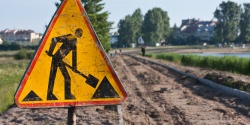Published: 14.11.2023

· Council and Parliament have reached agreement on new rules for restoring and protecting degraded habitats in the European Union.
· The aim of the draft regulation on the restoration of natural resources is to introduce measures that will restore ecosystems by 2050.
· The regulation is controversial among EU member states, MEPs and food producers.
· The effect of implementing the new legislation will be to give the European Commission additional powers to control the progress of nature restoration and the impact on construction investments.
· This could lead to blocking the construction of strategic infrastructure such as motorways or airports.
In June 2022. The European Commission presented a proposal for a regulation of the European Parliament and of the Council on nature restoration (Nature Restoration Law). The proposal is linked to the EU Biodiversity Strategy 2030 'Bringing nature back to our lives'. Controversy in the adoption of the proposed solutions is reflected in the fact that, in June 2023, the EP's Agriculture, Fisheries and Environment Committees tabled more than 2,000 amendments to the proposal. This lack of support for the new solutions at committee level, resulted first in a vote to reject the proposed regulation in the EP (which, however, did not take place), resulting in numerous amendments to the draft.
At the end of last week, following trilateral negotiations between the EP, EC and Council, the EU Council Spokesperson's Office reported that the Council and Parliament had reached agreement on new rules for the restoration and protection of degraded habitats in the European Union. Until now, the legal basis for EU policy in this area has been the 1992 Habitats Directive and the 2002 Birds Directive, which formed the basis for the creation of the Natura 2000 network. However, the EU believes that new rules governing this matter, adapted to current realities and climate threats, are needed.
Climate change and the economy
The aim of the draft Regulation on the restoration of natural resources is to contribute to the continuous, long-term and sustainable restoration of biodiverse and resilient nature in the EU's terrestrial and marine areas, through ecosystem restoration. The legislation is also intended to contribute to the Union's climate change mitigation goals. According to the proponents of these modifications, more than 80 per cent of habitats (areas where certain plants and animals are found) in the European Union are currently in a poor state, and environmental restoration is necessary to effectively combat climate change and prevent natural disasters.
If adopted as such, the document will become the first act to impose obligations on Member States for the permanent restoration and protection of biodiversity. The act is drawn up in the form of a regulation and will be directly applicable. This means that Member States will be obliged to work towards long-term goals by introducing national restoration plans, which in the long term would contribute to the effective implementation of the European Green Deal (i.e. the EU achieving climate neutrality by 2050). In addition, the EU obliges Member States to put in place restoration measures by 2030 (at least 20% of EU terrestrial and marine ecosystems are to be covered in total) and by 2050. - all ecosystems in need of restoration. However, when analysing the proposal, it is difficult to find clearly defined actions to be taken by the Member States, beyond the general assumption that each country is to meet the targets that will be set.
The legal basis for the proposal, based on the principles of subsidiarity and proportionality, is Article 192(1) of the Treaty on the Functioning of the European Union, which sets out how Article 191 of the Treaty (which sets out the objectives of EU environmental policy) is to be implemented. The project has basically as many supporters as opponents. The former see benefits in the agricultural sector - building resilience to natural disasters, improving land and water quality. Opponents, on the other hand - mainly farmers, point to the lack of a ring-fenced budget for the implementation of the regulation and the imposition of new, costly obligations. Business representatives also accuse the restriction of land for investment, including the construction of infrastructure related to the energy transition.
What does Poland stand to lose?
However, it is important to note at what cost the European Union will begin to impose its solutions. Won't the new restoration plans, which are not clear anyway, become laws to directly affect and restrict economic freedoms? Further concerns relate to the transfer of additional powers to the European Commission to control the progress of nature restoration, cost-sharing in the implementation of the new regulations and the impact on construction investments.
The adoption of the regulation may result in blocking the construction of strategic infrastructure (such as motorways or airports) essential for the functioning of society and the state, which in turn will contribute to slowing down the pace of development in developing countries and reinforcing the dominance of stronger and older economies. Further Natura 2000-type programmes will block investment, which clearly violates the sovereignty of our country and restricts the economy and private property, and this is incompatible with the Polish raison d'état. For Poland, if the regulation is adopted, it will also be a challenge to take due account of farmers' interests.
Dr Przemysław Kulawiński - Analyst at the Ordo Iuris Centre for International Law

09.04.2025
• On April 8, the Ordo Iuris Institute presented the Polish version of a document with proposals for reforming the European Union, prepared jointly with Hungary’s Mathias Corvinus Collegium (MCC).


• The European Union’s Council Conclusions on EU Priorities in UN Human Rights Fora in 2025 identify key areas of EU human rights activities at UN fora and refers to several universal human rights, such as freedom from torture and freedom of religion or belief.

10.03.2025
Over the past 70 years, the European Union has evolved from a simple economic cooperation project into a powerful supranational entity with its own currency, court, and ability to impose financial sanctions on Member States.